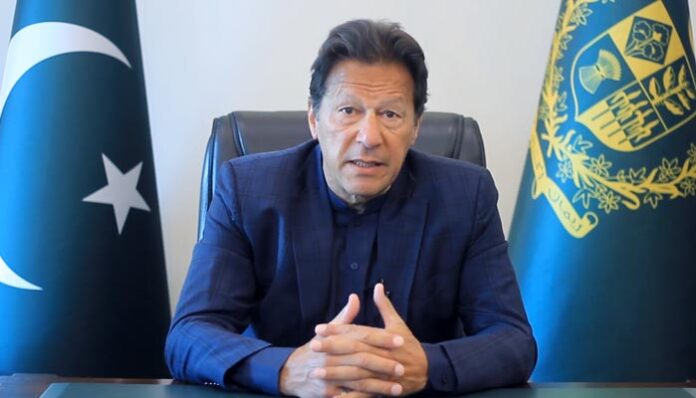ISLAMABAD: Prime Minister Imran Khan has emphasised on global efforts to invest in sustainable agriculture infrastructure and ensure adequate and fair prices for agricultural and food products to end poverty and hunger in the world.
The PM was speaking virtually at the Governing Council of International Fund for Agricultural Development (IFAD) in Italy on Wednesday, in which he proposed a five-point agenda on the subject.
PM Imran highlighted the need to devise a joint strategy to confront the global economic shocks triggered by the Covid-19 pandemic, saying: “We will perish or survive together.”
The premier also spoke about the dangers of global hunger and malnutrition affecting hundreds of millions of people, cautioning that the world today faces a “looming agricultural crisis”.
He said agriculture is central to human survival and 600 million people suffer from hunger even as the global population is about to hit eight billion.
The Covid-19 pandemic is likely to push another 100 million people into extreme poverty, the PM noted, saying more than 20 countries are food insecure, while the World Food Programme has warned of the danger of famine in some of the poorest countries and conflict zones.
“The world faces multiple challenges in recovering from the pandemic and achieving [the] vital first two sustainable development goals (SDGs) — no poverty and zero hunger,” Imran said, adding that there was a lack of financing, shortage of investment, trade distortions, unsustainable production and consumption patterns, degradation of agricultural lands and forests, an impending water crisis, loss of biodiversity, and polluted rivers and oceans.
“We need a revolution in our vision of our future. The Covid-19 pandemic and the climate crisis should drive home the message to all rich and poor, weak or powerful that their destinies are intertwined. We will perish or survive together,” he emphasised.
The PM stressed that the concepts of geo-strategic adversaries, regional or global domination, political advantages of foreign intervention and occupation, and the oppression of people are “outdated and will soon be seen as irrelevant”.
“We need a common plan and strategy for global recovery and survival and prosperity of all humanity in response to the recession triggered by the Covid-19 crisis,” he said, recalling his proposal for a global initiative on debt relief last April.
While the debt suspension announced by the G20 countries and the emergency lending programmes of the World Bank, IMF and others have provided “some breathing space”, the Prime Minister said, the developing countries require $4.3 trillion to recover from the pandemic and achieve the SDGs, according to the latest estimates.
He proposed the following five-point agenda to end poverty and hunger:
First, there is a need to invest in sustainable agriculture infrastructure to facilitate transport, production and distribution of agricultural inputs and food products, for which the ‘green lanes’ created by China are a good example.
Second, the governments need to more actively ensure adequate and fair prices for agricultural and food products.
Third, the new and breakthrough agricultural technologies and techniques must be consciously applied to enhance food production, ensure efficient usage of water and land, and above all improve seed quality. IFAD and the FAO can play an important role in this context.
Fourth, the adoption of digital technologies is as vital in agriculture as in other economic sectors. Ensuring internet and broadband access to the rural areas will be vital for their integration into national and global supply chains.
Fifth, there is a need to rethink patterns of food consumption and production. “We can eat better and many of us would do well to eat less. We can produce food with greater respect for nature, we can stop the pollution of our lakes, rivers and oceans. We can produce more with less water and without dangerous chemicals.”
The PM further said a new strategy for sustainable food production and consumption should be considered and adopted at the Food Systems Summit scheduled for next year.
As part of national development efforts, he said his government had accorded the highest priority to achieve SDG-1 (no poverty) and SDG-2 (zero hunger).
The Premier said his government plans to plant 10 billion trees over the next three years and will set aside eight large areas as national reserves or national parks.
“Under the China-Pakistan Economic Corridor, agricultural modernisation has been included as a vital element of our development strategy. This will move us significantly towards combating hunger and poverty,” the Prime Minister said.




